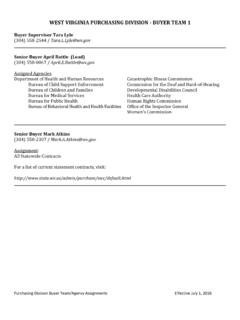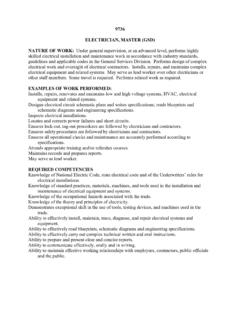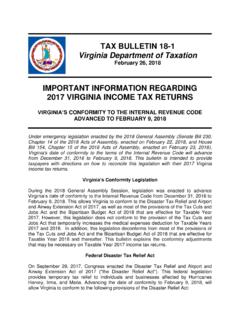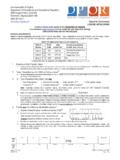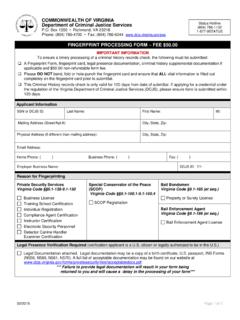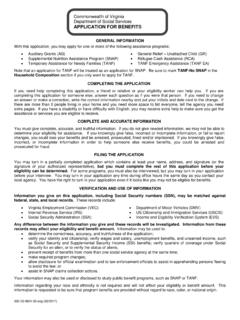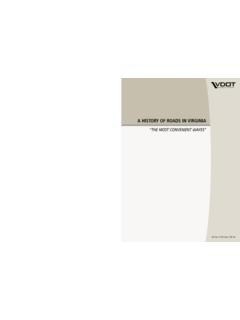Transcription of West Virginia State Tax Department
1 west Virginia State Tax DepartmentSummary Of Tax Responsibilities ofWest Virginia ResidentsThis publication is a general summary of taxes imposed by the State of west Virginia on resident information may be found in the west Virginia Tax Laws booklet and other publications of this are not a substitute, however, for legislative regulations or for the tax laws INCOME TAXThe west Virginia Personal Income Tax is an annual tax similar to the federal income tax. Calendar year taxpayers must file anannual return by April 15th of each year for the preceding adjusted gross income is the starting point for determining west Virginia Personal Income Tax. A number of increasingand decreasing modifications are made to determine west Virginia adjusted gross example:A individual who is age 65 or older, who has been certified permanently and totally disabled (regardless of age), may deductfrom their federal adjusted gross income up to $8,000 of his or her income received from any source.
2 If a joint return isfiled by two qualifying individuals, up to $8,000 of income received by each individual may be Low-Income Earned Income exclusion, based on filing status and earned income, may be taken in order to reduceWest Virginia taxable Family Tax Credit became available in 2007 to individuals or families that meet certain income criteria. The maximumcredit for tax year 2007 will offset 50% of the income tax due, and the maximum credit for subsequent years will offset 100%of the income tax exemption of $2,000 is allowed for each personal exemption claimed for federal income tax purposes. west Virginia does notallow either a standard deduction or itemized deductions to be claimed when determining west Virginia taxable order to avoid an underpayment penalty, at least 90% of an individual s tax liability must be prepaid through any combinationof employer withholding and/or payments of estimated CITIZENS TAX CREDITT axpayers who are eligible for the Homestead Exemption for property tax purposes may be eligible for a refundable tax creditbeginning in tax year 2003.
3 Credit eligibility is restricted to taxpayers who participate in the Homestead Exemption program, who incurand pay property taxes, and whose federal adjusted gross income is less than 150% of federal poverty guidelines. For tax years 2003through 2006, the credit is based on the amount of property taxes paid on the first $10,000, or portion thereof, of the taxable assessedvalue over the $20,000 Homestead Exemption. Beginning tax year 2007, the credit was based on the amount of property taxes paidon the first $20,000, or portion thereof, of the taxable assessed value over the $20,000 Homestead additional information see Publication TAXThe Consumers Sales and Service Tax ("sales tax") is imposed on all sales of tangible personal property or taxable services unlessthe sale is specifically exempt by statute. Tax applies to sales of food but not to sales of prescription drugs. Tax does not apply toprofessional services, personal services (such as those rendered to an individual by barbers and beauticians), services regulated bythe Public Service Commission, or capital improvements to real property.
4 The rate of tax is 6 percent of the sales July 1, 2008, the Sales Tax and Use Tax was reduced to 3% on the sales, purchases and uses of food and food ingredientsintended for human consumption. However, the reduced rate of tax does not apply to sales, purchases and uses by consumers ofprepared food, food sold through vending machines and soft drinks. Lists of exempt food items and prepared food items can be foundin Publication 6 percent compensating use tax is imposed on persons purchasing tangible personal property or taxable services from out-of-statevendors when the purchase is for use in this State . Food and food ingredients intended for human consumption are taxed at 3%. Unlessthis tax is collected by the out-of- State vendor, it must be remitted directly to the Tax Commissioner. Credit is allowed for sales or use taxespaid to another State with respect to the TAX ROPERTY TAThe west Virginia Property Tax is an annual tax imposed on personal (tangible as well as intangible) and real property.
5 Collectionsprimarily benefit county boards of education, county commissions and TSD-387(Rev. July 2009)The west Virginia Constitution specifies that the assessed value of property is 60 percent of its fair market value. All property istaxable except that which the Constitution exempts from taxation and that which the Legislature exempts from taxation pursuant to anexpress grant of authority in the Constitution. Exemptions of particular interest to individuals include: cash, bank accounts, householdgoods and personal effects. Owners of owner occupied residential real property, who are age 65 or older (or who are permanentlyand totally disabled), may be eligible for a $20,000 homestead exemption. Application for this exemption must be submitted to theassessor of the county in which the property is located by October 1st for the next calendar year. (New residents have a two year waitingperiod.)
6 The Constitution divides property into four classes for purposes of taxation and imposes a ceiling on the amount of tax that maybe imposed on each class. The maximum regular levy rate on Class I property cannot exceed 50 cents per $100 of assessed value.(Class II property - $ ; Class III property - $ ; and Class IV property - $ per $100 assessed value.) Additional or excess leviesmay be imposed only upon approval of the voters. Excess levies must be voted upon every three years. (Excess school levies are goodfor five years.) The statewide average levy rate for all property for the 1990 tax year was $ per $100 of assessed such as taxable stocks, bonds and promissory notes are Class I property. Owner occupied property used exclusivelyfor residential purposes and farms are Class II property. Property that is not Class I or II property is Class III property if it is located outsidea municipality; if located inside a municipality it is Class IV is assessed in the county where it is located on July 1st each year by a locally elected county assessor for the next calendaryear ('tax year").
7 This assessed value is used to determine property taxes. Individuals must file a property tax return with their countyassessor by October 1st for the next calendar year. Questions about the assessed value of property may be raised with the countyassessor after the property is returned for taxation but before the end of January of the then current tax year. The county commissionof each county sits as a board of equalization and review during the month of February each tax year to review and equalize assessmentsfor that calendar year and to hear appeals concerning assessed value. Property tax levy rates are set by the various levying bodiesduring the month of April. Property tax bills (called tax tickets) are mailed to property owners during the month of July by county sheriffs,who collect the tax. Taxes are payable in two equal installments. First-half taxes are due September 1st of the tax year and second-half taxes are due March 1st of the next tax year.
8 A percent discount is allowed for early payment. First-half taxes become delinquenton October 1st of the tax year and second-half taxes become delinquent April 1st of the next tax year. Interest accrues at the rate of 9percent per year on delinquent VEHICLE TAXES An individual who titles a motor vehicle with the west Virginia Division of Motor Vehicles must pay a 5% sales tax based on thesales price of the vehicle regardless of whether it was purchased in or outside of west TAXFor persons dying after June 30, 1985, west Virginia no longer imposes an inheritance and transfer tax. west Virginia continuesto impose an "estate pick-up tax" on resident estates and nonresident estates with real or tangible personal property located in thisState, when such estate is required to file a Federal estate tax return and is allowed credit against its Federal estate tax liability for paymentof west Virginia estate taxes.
9 This return is due nine months after decedent's death along with payment of any tax that may be tax not paid on or before that date is subject to interest and additions to west Virginia estate tax is equal to the amount of credit the estate is allowed for payment of federal estate taxes. If death taxesare paid to two or more states , the Federal estate tax credit is apportioned among the states in which tax is deaths occurring on or after January 1, 2005, there is no longer a federal credit for State death taxes. Therefore, the west VirginiaEstate Tax no longer TAX EXCISE TAXWest Virginia imposes a cents per gallon excise tax on gasoline and special fuel sold in this State . "Special fuel" means anyfuel other than gasoline which is commonly used or practically suited for use as a fuel in an internal combustion Virginia also imposes a cents per gallon sales tax on gasoline and special TAXA ssistance may be obtained by callingTaxpayer Services Division(304) 558-3333 or 1-800-WVA-TAXS (1-800-982-8297)A TDD Service is available for the hearing impaired by calling 1-800-2 TAXTDD (1-800-282-9833)To order forms or publications call the automated information system at: (304) 344-2068 or 1-800-422-2075Or visit our website.





